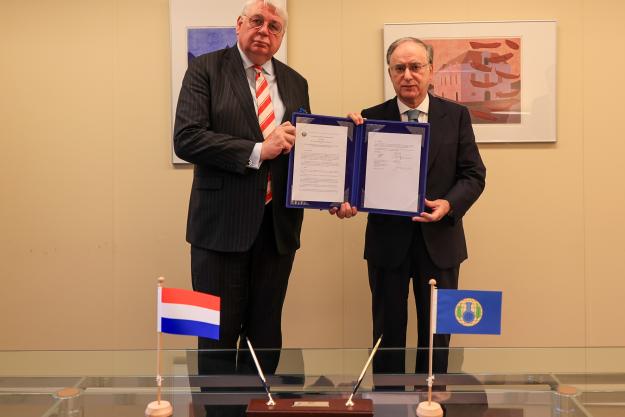The Government of the Kingdom of the Netherlands has made a voluntary contribution of €500,000 to the OPCW Trust Fund for Syria Missions.
The contribution will support the continuous work of the OPCW in the recent evolving political situation in Syria. The contribution will be used towards the full elimination of the Syrian Chemical Weapons Programme as well as for investigating the allegations of use of chemical weapons and identifying the perpetrators of their use, in accordance with the Chemical Weapons Convention (CWC), relevant decisions of the policy-making organs of the OPCW and resolutions of the United Nations Security Council. In particular, the contribution will be used to support the activities of the Declaration Assessment Team (DAT), the Fact-Finding Mission (FFM), and the Investigation and Identification Team (IIT).
The voluntary contribution was formalised today in a signing ceremony held between the Ambassador, Permanent Representative of the Kingdom of the Netherlands to the OPCW, H.E. Mr Henk Cor van der Kwast, and the OPCW Director-General, Ambassador Fernando Arias, at the Organisation's Headquarters in The Hague.

Ambassador Van der Kwast remarked: "The OPCW is indispensable for destroying stockpiles of chemical weapons in Syria and collecting evidence on the illegal chemical weapons program of the Assad regime." He went on to highlight the Netherlands' support, stating: "That's why the Netherlands is contributing €500,000 to OPCW missions in Syria to support these efforts."
The Director-General expressed his sincere appreciation to the Netherlands for its timely and important support to the OPCW's work on the Syrian chemical weapons dossier. He stated: "After 11 years at the OPCW, Syria needs to come into full compliance and fulfil all its obligations under the Chemical Weapons Convention. The evolving political landscape in Syria may present an opportunity for the OPCW to achieve the complete elimination of Syria's chemical weapons programme, and to take part in the process of the international accountability of the former Syrian Government."
He further stated: "For this purpose, the Secretariat will continue, more than ever, its work in Syria and will need to rely on the support from States Parties for additional financial and human resources. Continued and timely additional financial contributions from States Parties, such as the generous support from the Netherlands today, will be essential to ensure that the Secretariat can carry out its future missions in Syria."
Background
The Kingdom of the Netherlands has been an active member of the OPCW since the Chemical Weapons Convention entered into force in 1997. To date, the Netherlands has made over €8 million in contributions to various OPCW funds including the Trust Fund for OPCW Conference of the States Parties and Special Sessions Meetings and the Trust Fund for the Implementation of Article X.
The Director-General, in consultation with the Chairperson of the Executive Council, Ambassador Andrés Terán Parral of Ecuador, and in accordance with Rule 12(b) of the Rules of Procedure of the Council, convened a meeting (EC-M 66) on 12 December 2024 to receive information from the Director-General on the situation in the Syrian Arab Republic in relation to the Syrian chemical weapons programme.
The Declaration Assessment Team was established in 2014 to engage the relevant Syrian authorities to resolve the identified gaps, inconsistencies, and discrepancies in the Syrian declaration. The Fact-Finding Mission was set up in the same year in response to persistent allegations of chemical weapon attacks in Syria, with the task to establish facts surrounding allegations of the use of toxic chemicals for hostile purposes. The Investigation and Identification Team began its work in 2019 and is responsible for identifying the perpetrators of the use of chemical weapons in Syria.
As the implementing body for the Chemical Weapons Convention, the OPCW, with its 193 Member States, oversees the global endeavour to permanently eliminate chemical weapons. Since the Convention's entry into force in 1997, it is the most successful disarmament treaty eliminating an entire class of weapons of mass destruction.
In 2023, the OPCW verified that all chemical weapons stockpiles declared by the 193 States Parties to the Chemical Weapons Convention since 1997 - totalling 72,304 metric tonnes of chemical agents - have been irreversibly destroyed under the OPCW's strict verification regime.
For its extensive efforts in eliminating chemical weapons, the OPCW received the 2013 Nobel Peace Prize.






